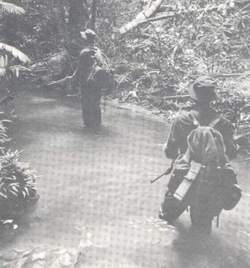|
From the beginnings as the Malayan Peoples' Anti-Japanese Army (a
militant faction of the Malayan Communist Party), the armed components of this group were equipped in a hodge-podge fashion.
Initially formed as a group with the political goal of ejecting the British from Malaya, the MCP became a British and US supported
Anti-Japanese guerilla force. This was not due to excessive MCP resentment against the Japanese, but based on orders
by Stalin to all organizers of Communist Insurgency to co-operate with his western allies for the duration of the war, and
to preserve Russia's resources.
| Mauser C96 7.63 calibre Pistol |
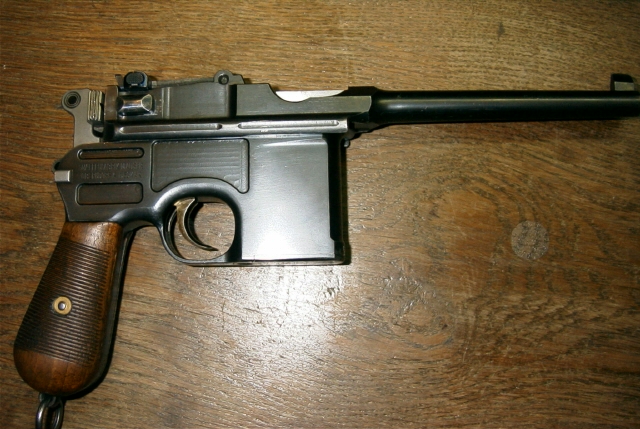
|
| 10-shot stripper-clip loading fixed magazine |
Initial armament for the various Communists groups existing in Malaya from
their founding in the 1920's were a variety of handguns, a few hunting rifles and even a few firearms supplied by the Russians
(although in small numbers and as a "token" support to leaders only). These did not include Russian made weaponry, but mostly
German WW1 leave-behinds from Russian reserve stocks, such as G 98 Rifles and C 96 pistols.
| Weapons like this German Karabiner 88... |

|
| ...were provided to the MCP by Russia before the war |
During the Japanese occupation, the Communists had to do initially with
a few captured Japanese arms, and some police weaponry either captured or actually handed out from police stations and
armories.
| Japanese Captured guns of the MCP |
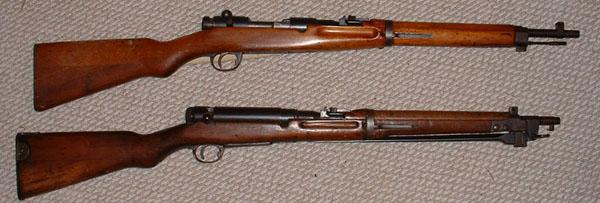
|
| Arisaka Type 38 and Type 44 6.5mm Carbines |
Around 1942, the British and Americans realized that if the insurgents
were well enough supplied to be a thorn in the side of the Japanese forces occupying the area, they would in effect tie down
large numbers of Japanese forces, serve in a reconnaissance function, and could be counted on to commits acts of sabotage.
Thus, about mid-year, British and U.S. "advisors" along with some
Australian volunteers begun to systematically arm the Malay insurgents. Arms were from a variety of sources, including
some US 03A3 Springfields, British SMLEs, some light machineguns and a smattering of Dutch weaponry courtesy of
the Dutch Navy, which included M95 Mannlicher Carbines, Rifles and Some Dutch No.2 Handgrenades.
As the war progressed, More modern US and British kit was provided, such
as BREN guns, Sten SMGs, Thompson SMGs, M1 Carbines and a goodly lot of other military supplies, such as explosives, rations
(even some fresh US Ks and British Compo, but mostly fresh foods and rice), radios and medical supplies.
| US Made .45 Caliber Thompson M1 Submachine Gun |
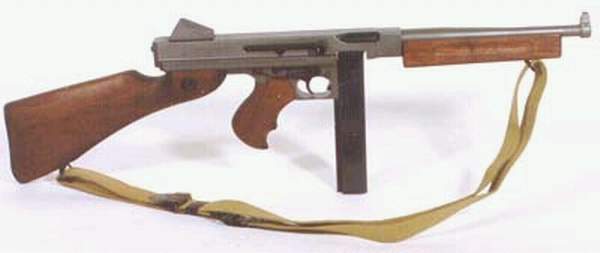
|
| One of the more effective weapons in the MCP arsenal |
No sooner was WW2 over, did the Communists under Lau Yew start their activities
anew, this time with their original goal in mind, to establish a communist state of Malaya.
Needless to say, these efforts were not viewed as desirable by the British,
nor by the vast majority of the population which was happy with the status quo and personal property rights gained
under the British.
Failing to win popular support, the members of the MCP began a renewed
campaign against "foreign influence". When renewed legal efforts and occasional bullying tactics failed to provide the desired
results, the MCP started on a new campaign of terror and guerilla warfare, not only against the British, but also their countrymen
who were either not anti-British, or very much anti-Communist.
While the CP members initially drew on existing (albeit meagre) stocks
of weapons remianing from the war, they also began capturing British and Malay police weaponry, as well as personal firearms
from farms overrun in raids.
| Little in the way of modern Soviet or Chinese Made |
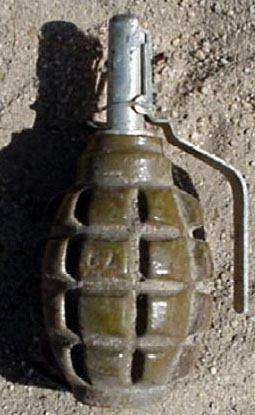
|
| Kit (like this F-1 Style Hand Grenade made it to the CTs |
Soon, capturing weapons became virtually impossible, and new supply sources
had to be found. Through their Chinese allies, the CT's started receiving an oddball assortment of Communist bloc weapons
(Some Russian Nagant rifles, Tokarev TT-33 pistols) as well as a mottley assortment of WW2 vintage "leftovers" acquired by
the Chinese via OSS arms drops and acquired Japanese arsenal stocks. The Chinese not only had the problem of also trying to
support the North Korean armed forces, leading to shortages of standard arms, but also one of balancing their efforts against
the possible success of the rebellion. As opposed to elsewhere in Asia where communist aggression could take a secure route
for supplies, all incoming items had to not only pass through third parties hostile to the cause, but also avoid the intense
efforts by both the British ground forces and the RAF to apply a stranglehold on CT supplies, an effort in which they eventually
would fail. How much the Chinese had wrestle dwith this idea may never become public knowledge, but it would appear that
red support for the CT's after late 1950 turned to a trickle, most of which consisting of "odd pieces" of captured weaponry,
or crudely manufactured weaponry stemming from the Chinese civil war. These include many virtually unserviceable Model 88
and 98 Mauser copies, and various models of modified former Japanese guns. Evidence of these can still be found in collector's
circles to this day. There are quite a few Arisaka rifles re-chambered to 8mm Mauser or 7.62x39 out there, and even though
shooting them is a hazardous undertaking, they are interesting collectibles of a time when Communism began running out of
steam in a little corner of Asia.
|
